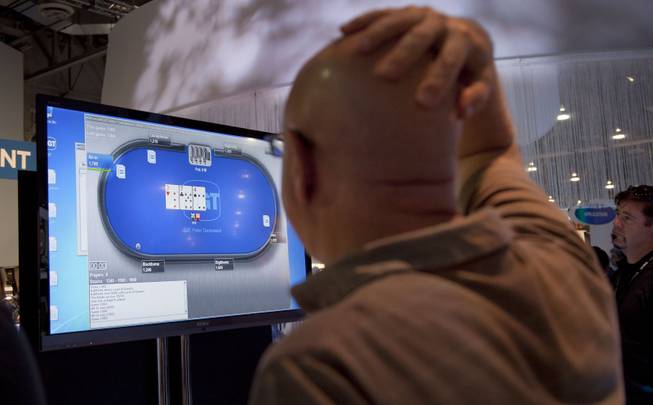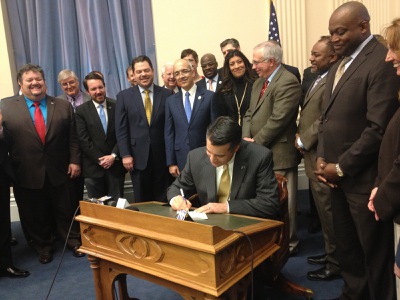
Julie Jacobson / AP
Casino industry representatives and exhibitors watch an online poker game during industry’s G2E conference, Tuesday, Oct. 4, 2011, in Las Vegas.
Wednesday, July 17, 2013 | 2 a.m.
Repeated attempts to legalize online poker at the federal level have failed.
Sen. Harry Reid has said the prospects of such legislation passing at this point are more than slim.
And individual states have taken the ball and run.
Still, one Republican congressman is on a mission to make online poker legal under federal law.
Sun archives
U.S. Rep. Joe Barton, R-Texas, at the behest of the Poker Players Alliance, is taking a second stab at introducing legislation that would make online poker legal for players — no matter which state they live in — and give the federal government regulatory oversight of the practice.
Barton says he’s doing it not just because he thinks it’s sound policy, but because he plays and loves the game. (Barton’s father reportedly gave up his ambition of being a professional poker player to marry Barton’s mother — a rather lengthy anecdote he shared while explaining his mission to reporters Tuesday.)
“My bill is a poker-only bill and a poker-only bill because I can honestly affirm that it is a game of skill,” Barton said. “When I play people I’m better than, I tend to win. When I play people I'm worse than, I tend to lose.
“I can defend poker-only with a straight face and a clear conscience.”
But while Barton’s bill would make only online poker legal — not any other forms of online gambling — it is silent on whether individual states can continue to make other forms of Internet gambling available to their residents.
And that distinction could sink the legislation.
For more
Barton’s bill does nothing to reverse the 2011 Wire Act interpretation that opened the floodgates for states to begin offering all forms of online gambling within their boundaries, including poker.
Since then, states have begun passing legislation to legalize both poker and other forms of gambling. This year, Nevada legalized online poker only.
In the past, efforts to get a law through Congress hinged on trading an express prohibition on other forms of gambling for a law legalizing only Internet poker. Such a tradeoff was seen as key to mollifying concerns of anti-gambling lawmakers about the proliferation of Internet games of chance.
It appears, however, that ship has sailed.
Lawmakers now would likely be loath to pass a law that would hamper their states' efforts to build an online gambling economy.
On the other hand, the fact the bill is silent on a state’s ability to legalize other forms of online gambling has become a selling point for its supporters.
“It would not prohibit states from doing it,” said John Pappas, PPA’s executive director, to ease concerns that it would halt New Jersey’s efforts to legalize online gambling. “That differs greatly from other bills we have seen introduced that would’ve prohibited other states from offering gaming.”
But that doesn’t necessarily mean Barton’s bill will be successful. A similar bill he sponsored two years ago failed, and the political landscape since then has become more difficult.
In an interview with the Sun last month, Reid acknowledged that the chances of legalizing online poker at the federal level are exceedingly slim.
Any pathway to success would have to run through both Reid and Sen. Dean Heller, R-Nev., who has worked at corralling Republican support in the Senate.
Barton acknowledged that he hasn’t worked directly with either of Nevada’s senators yet.
But he hopes that his bill will indicate to the Senate that the House — led by Republicans — is ready to play ball.
“Once we get it (through committee) we will have to look to the Senate to see what Sen. Reid or Sen. Heller might do,” Barton said. “If it looks like the Senate is serious, I think the House will be very serious.”
Although Reid has expressed skepticism that Congress will be able to act, neither he nor Heller have given up all hope.
Heller and Sen. Claire McCaskill will convene a hearing Wednesday into “how a state-based patchwork of laws and regulations for online gambling may put consumers at risk, undermine the efforts of law enforcement and leave offshore operators unregulated.”
The hearing before the Consumer Protection Subcommittee will renew the effort to build the case for federal legislation — and, with a focus on protection measures, conceivably put to rest some concerns opponents might have.
“This hearing will focus on potential consumer harms related to online gaming in the absence of a clear legal landscape or consistent oversight,” Heller’s spokeswoman Chandler Smith said.


Join the Discussion:
Check this out for a full explanation of our conversion to the LiveFyre commenting system and instructions on how to sign up for an account.
Full comments policy